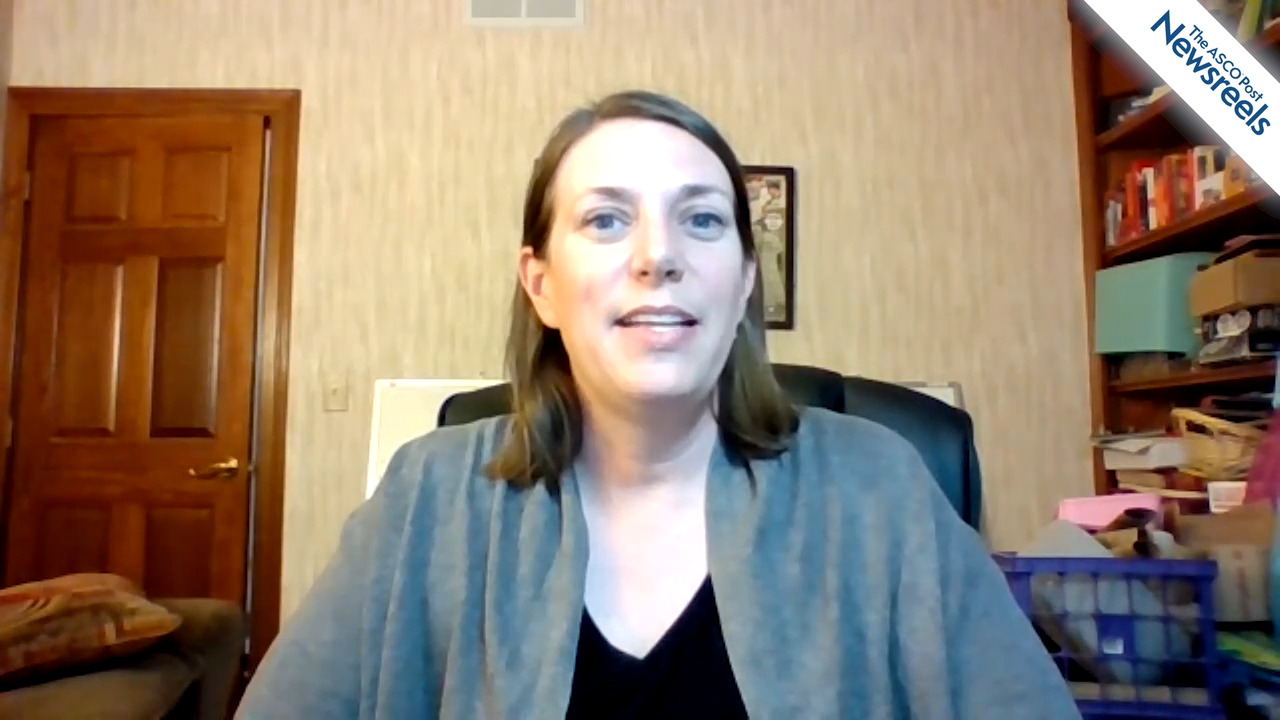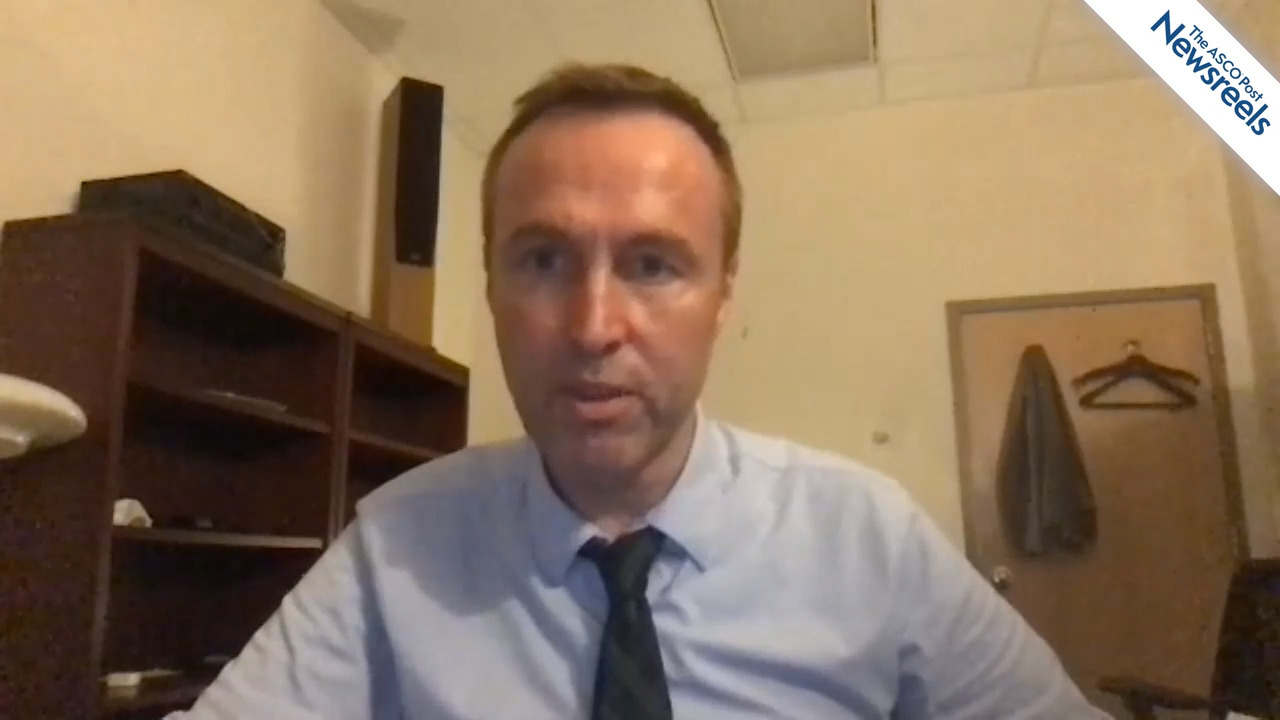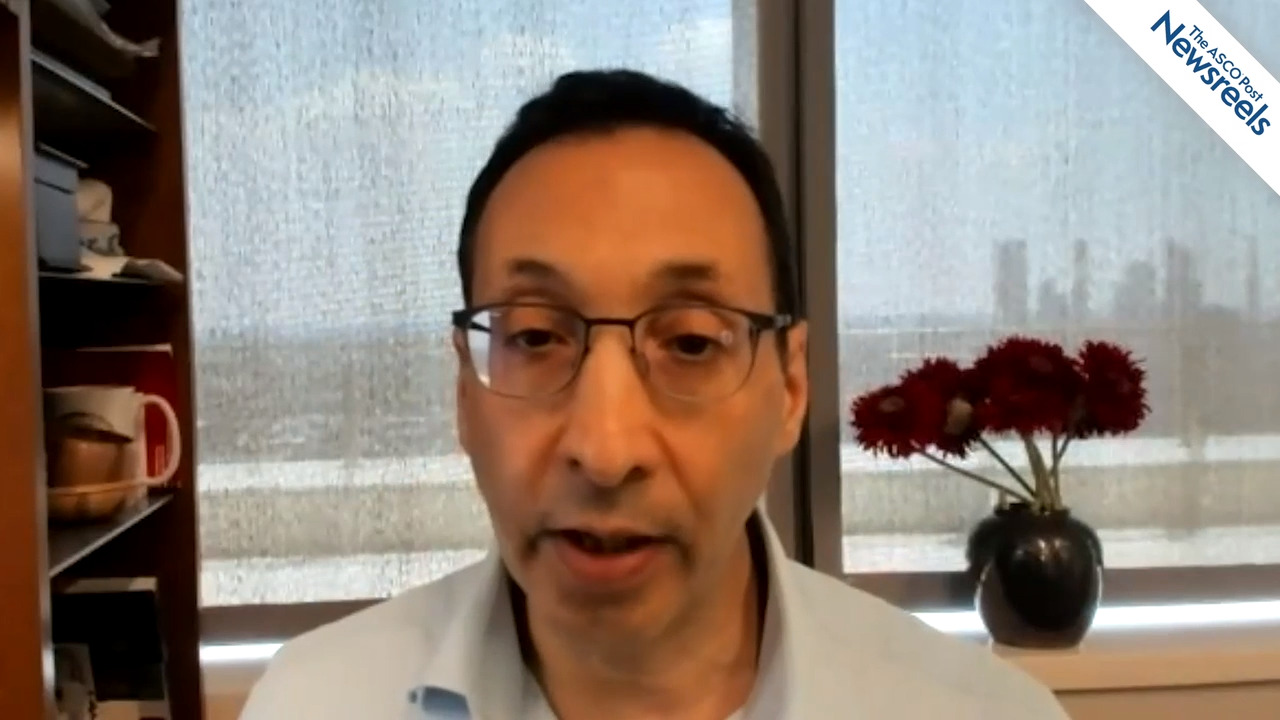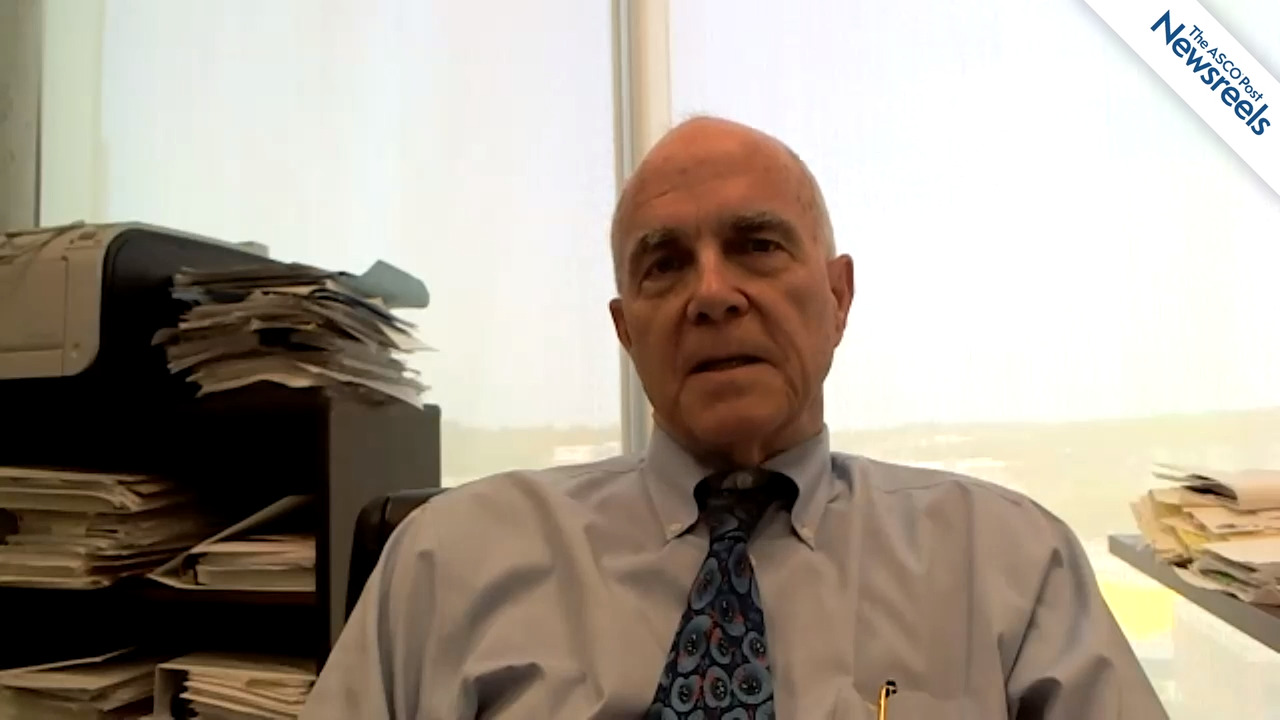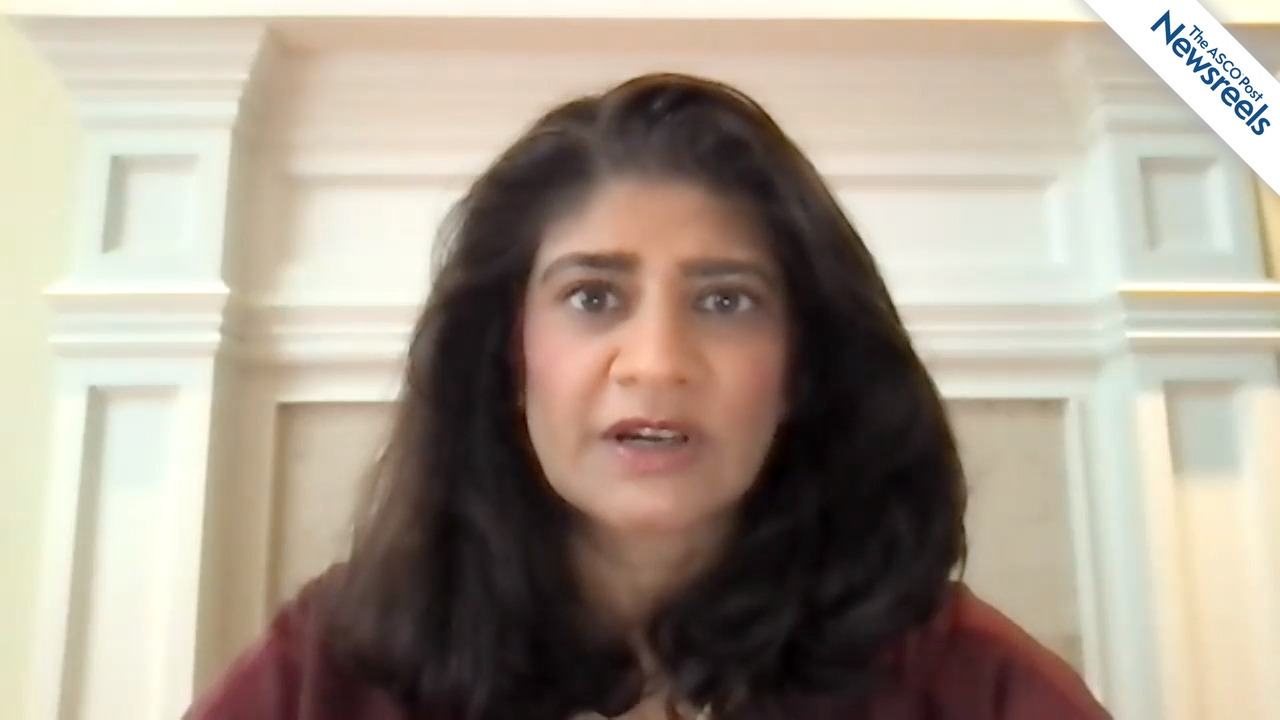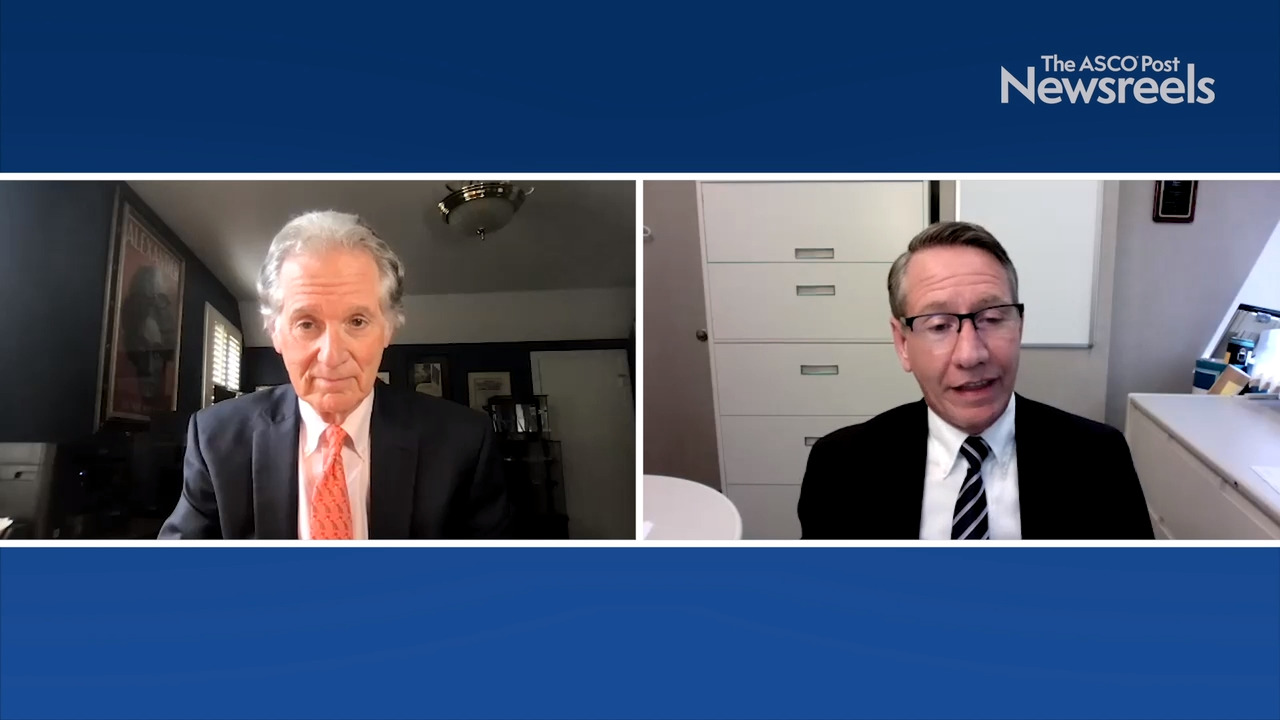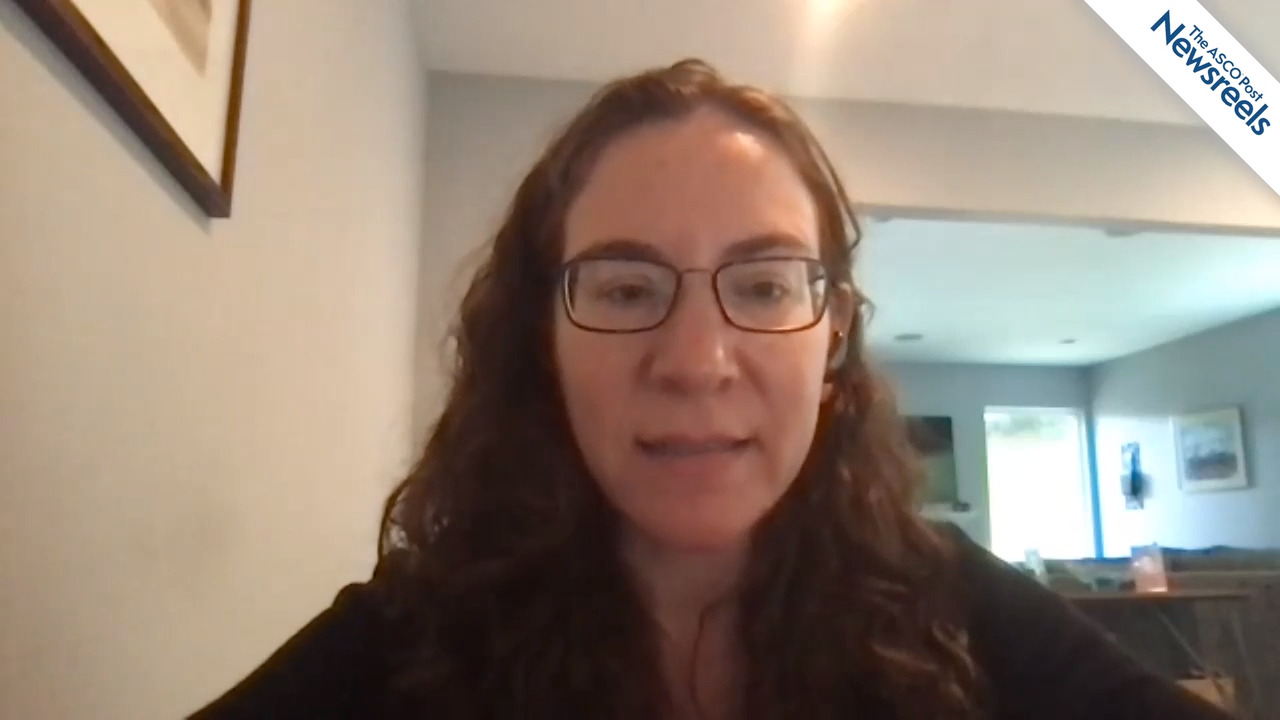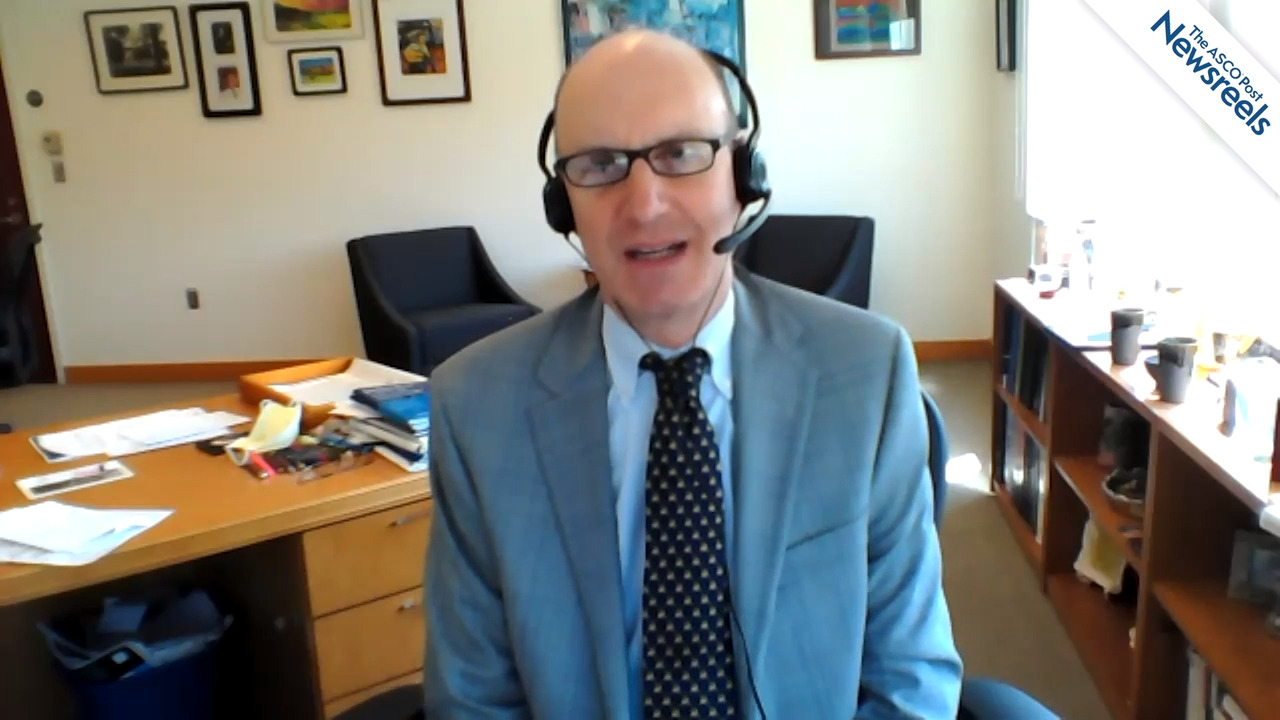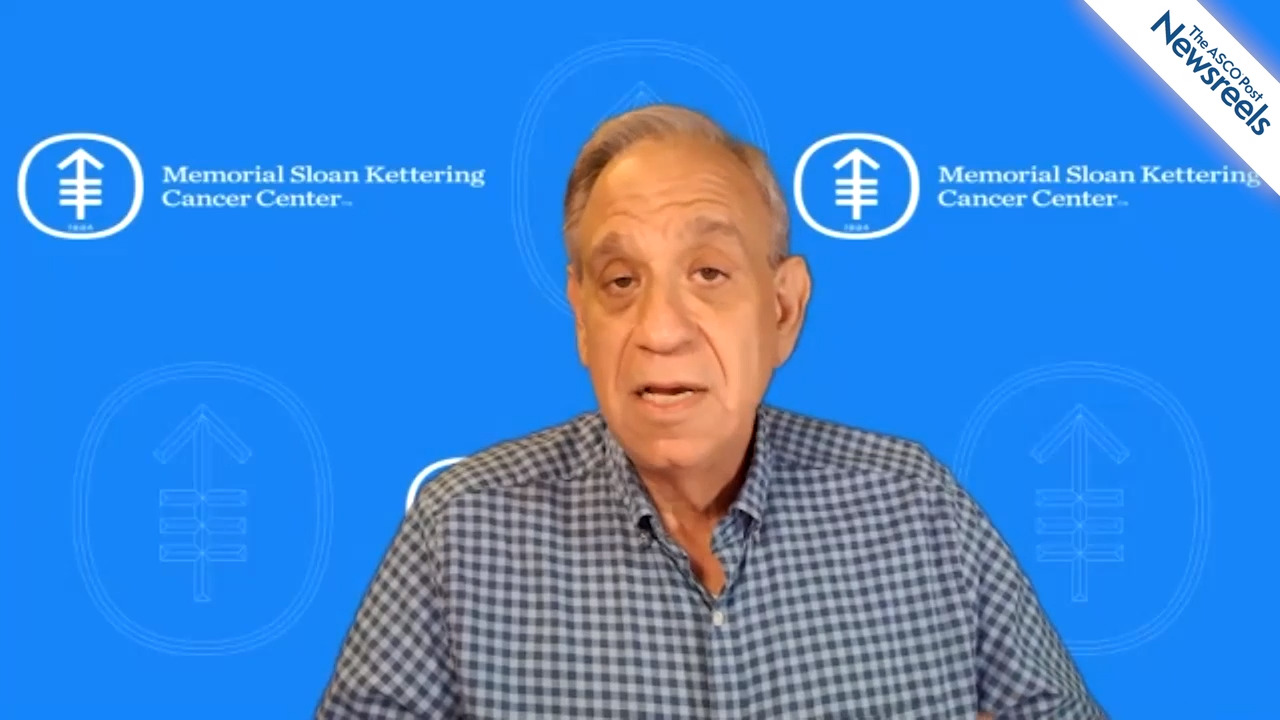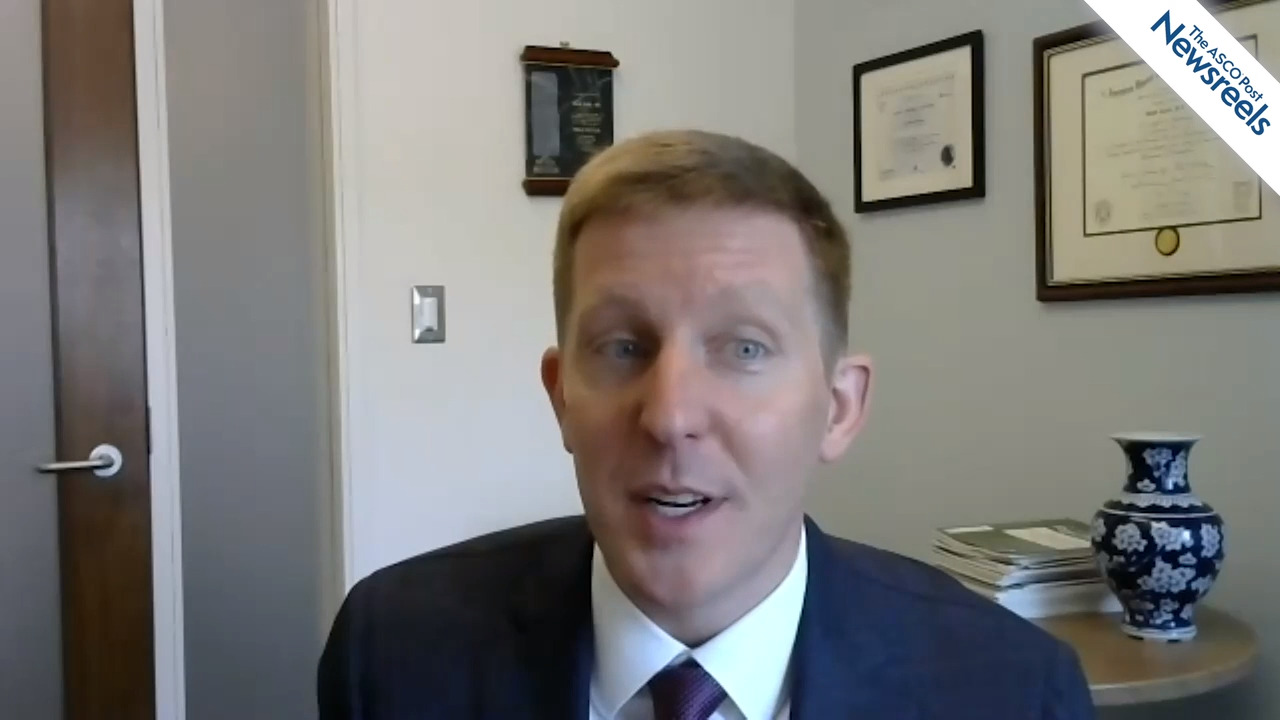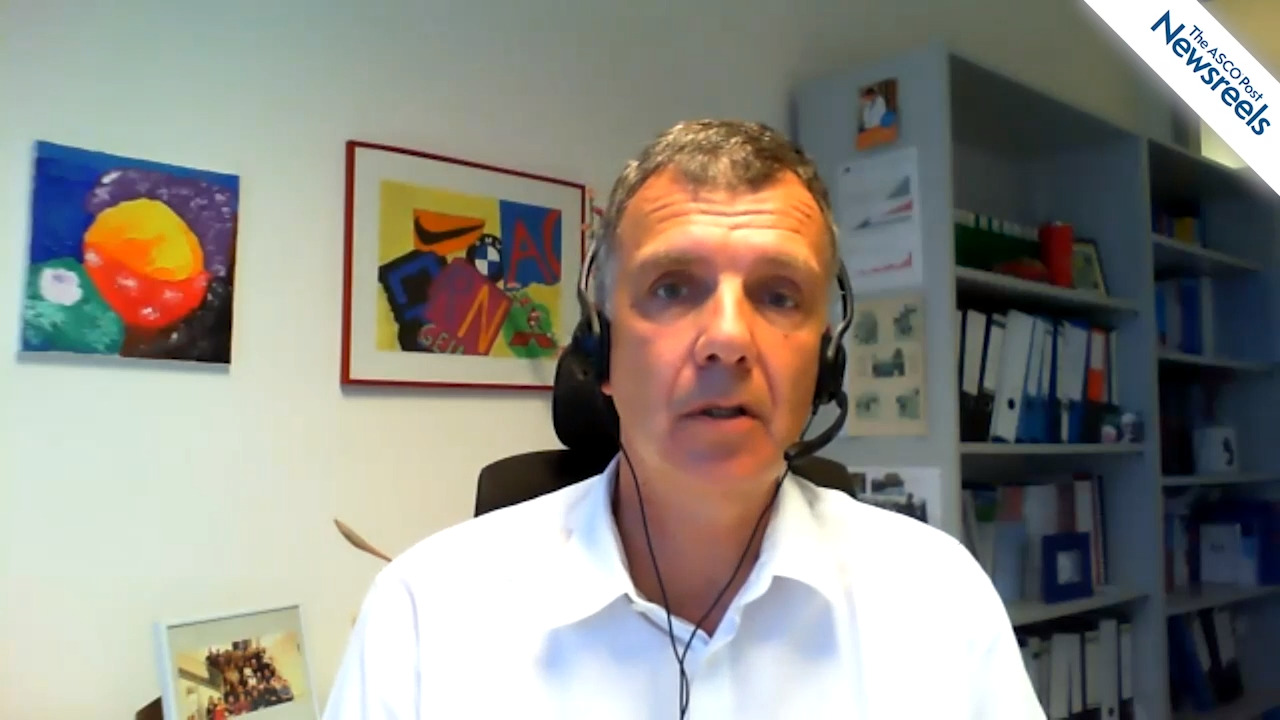Rituximab Maintenance vs Response-Adapted Postinduction Strategy in Advanced Follicular Lymphoma
In an Italian phase III trial (FOLL12) reported in the Journal of Clinical Oncology, Luminari et al found that a response-adapted postinduction strategy resulted in poorer progression-free survival vs standard rituximab maintenance in patients with previously untreated advanced follicular lymphoma...
Jennifer A. Woyach, MD, on CLL/SLL: Using Minimal Residual Disease Assessment in Clinical Practice
Jennifer A. Woyach, MD, of The Ohio State University Comprehensive Cancer Center, talks about whether modifications of treatment based on minimal residual disease is beneficial to patients with chronic lymphocytic leukemia and small lymphocytic lymphoma.
Ibrutinib Plus R-CHOP for Younger Patients With DLBCL
New evidence suggests that adding the Bruton's tyrosine kinase (BTK) inhibitor ibrutinib to a standard chemotherapy regimen may improve survival among younger people with a specific form of diffuse large B-cell lymphoma (DLBCL). The findings, published by Wyndham Wilson, MD, PhD, in Cancer Cell,...
Study Finds Younger B-Cell Non-Hodgkin Lymphoma Survivors May Have a Higher Risk of Age-Related Diseases Than Older Survivors
Non-Hodgkin lymphoma is one of the most common cancers diagnosed in the United States, accounting for nearly 4% of all cancers. This year, about 81,600 individuals will be diagnosed with non-Hodgkin lymphoma, and nearly 21,000 will die from the cancer. A study by Ocier et al published in Cancer...
FDA Pipeline: Novel Treatments in Lymphoma, Nasopharyngeal Cancer, Solid Tumors, and More
Recently, the U.S. Food and Drug Administration (FDA) granted Priority Review to agents for several kinds of lymphoma, as well as nasopharyngeal cancer; a Breakthrough Therapy designation for a treatment for patients with NTRK-positive advanced solid tumors; and Fast Track designation for...
Zanubrutinib for Relapsed or Refractory Marginal Zone Lymphoma
On September 14, 2021, the Bruton’s tyrosine kinase inhibitor zanubrutinib was granted accelerated approval for adults with relapsed or refractory marginal zone lymphoma (MZL) who have had at least one prior anti-CD20–based regimen.1 Supporting Efficacy Data Approval was based on findings in the...
Final Analysis of iNNOVATE: Addition of Ibrutinib to Rituximab for Waldenström’s Macroglobulinemia
As reported in the Journal of Clinical Oncology by Buske et al, the final analysis of the pivotal phase III iNNOVATE trial has shown a continued progression-free survival benefit with the addition of ibrutinib to rituximab in patients with Waldenström’s macroglobulinemia after 50 months of...
Tackling a Growing Need: Options After CAR T-Cell Therapy for Lymphoma
For aggressive B-cell lymphomas, chimeric antigen receptor (CAR) T-cell therapy saves lives, but relapse remains common, and a second-line standard of care is lacking. During the 2021 Pan Pacific Lymphoma Conference, Grzegorz (Greg) S. Nowakowski, MD, Professor of Medicine and Oncology, Lymphoma...
DA-EPOCH-R for Children and Adolescents With Newly Diagnosed Primary Mediastinal B-Cell Lymphoma
In a phase II trial reported in the Journal of Clinical Oncology, Burke et al found that dose-adjusted etoposide, doxorubicin, and cyclophosphamide with vincristine and prednisone plus rituximab (DA-EPOCH-R) did not improve event-free survival vs historical controls in children and adolescents with ...
Axicabtagene Ciloleucel for Adult Patients With Primary Mediastinal B-Cell Lymphoma: Real-World Outcomes
In a retrospective cohort study reported in a research letter in Blood Advances, Jennifer L. Crombie, MD, and colleagues found that axicabtagene ciloleucel produced high overall and complete response rates in patients with primary mediastinal B-cell lymphoma. They also observed some evidence to...
Kieron M. Dunleavy, MD: Update on Primary Mediastinal B-Cell Lymphoma
Kieron M. Dunleavy, MD, of Georgetown University, offers insights into the latest data on treating patients with primary mediastinal B-cell lymphoma: the optimal regimen; whether radiotherapy or stem cell transplants are needed; new information on the biology of the disease; novel agents such as CAR T-cell therapy and immune checkpoint inhibitors, and incorporating them into upfront treatment.
Older Adults With Primary CNS Lymphoma: Treatment Opportunities and Challenges
The ASCO Post is pleased to present the Hematology Expert Review, an ongoing feature that quizzes readers on issues in hematology. In this installment, Drs. Abutalib, Desai, and DeAngelis explore the treatment of older patients with primary central nervous system lymphoma (PCNSL), which pose...
Lymphoid Malignancies: What’s Next for Antibody-Drug Conjugates?
Antibody-drug conjugates are improving outcomes of patients with lymphoma, often those who have exhausted treatment options after chimeric antigen receptor (CAR) T-cell therapy. Four available antibody-drug conjugates are in the clinic, with brentuximab vedotin moving into the front-line...
Putting Radiotherapy to Best Use With CAR T-Cell Therapy in Lymphoma
The integration of radiation therapy into chimeric antigen receptor (CAR) T-cell therapy may improve outcomes for patients with relapsed or refractory lymphoma, according to Charles A. Enke, MD, Professor and the Bill Bures and Jerry Pabst Chair in Radiation Oncology at the Fred and Pamela Buffett...
Bispecific Antibodies Find a Place in B-Cell Lymphoma Treatment
In relapsed or refractory B-cell lymphomas, bispecific T-cell engager antibodies are finding a place in the treatment algorithm, said Christopher Flowers, MD, MS, FASCO, Professor and Chair of the Department of Lymphoma/Myeloma at The University of Texas MD Anderson Cancer Center, Houston. At the...
Long-Term Outcomes in JULIET Trial of Tisagenlecleucel for Relapsed or Refractory Aggressive B-Cell Lymphomas
As reported by Stephen J. Schuster, MD, and colleagues in The Lancet Oncology, long-term outcomes of the pivotal phase II JULIET trial showed overall and complete response rates of 53% and 39% in adult patients with relapsed or refractory aggressive B-cell lymphomas treated with the T-cell...
Bispecific Antibody Epcoritamab in Relapsed or Refractory B-Cell Non-Hodgkin Lymphoma
In a phase I/II study reported in The Lancet, Hutchings et al found that the novel bispecific antibody epcoritamab produced high response rates in patients with relapsed or refractory B-cell non-Hodgkin lymphoma. Epcoritamab works by targeting CD3 and CD20 and inducing T-cell–mediated cytotoxic...
FDA Grants Zanubrutinib Accelerated Approval in Relapsed or Refractory Marginal Zone Lymphoma
On September 15, zanubrutinib (Brukinsa), a small-molecule inhibitor of Bruton’s tyrosine kinase (BTK), received accelerated approval from the U.S. Food and Drug Administration (FDA) for the treatment of adult patients with relapsed or refractory marginal zone lymphoma who have received at least...
Assumptions, Data … and More Questions!
I read with great interest the results from the phase II ZUMA-12 study of axicabtagene ciloleucel, presented during the 2020 American Society of Hematology (ASH) Annual Meeting & Exposition.1 But the results raised several questions for me. Axicabtagene ciloleucel, an autologous anti-CD19...
FDA Approves Zanubrutinib for Waldenström’s Macroglobulinemia
On August 31, the U.S. Food and Drug Administration (FDA) approved zanubrutinib (Brukinsa), a Bruton’s tyrosine kinase inhibitor, for adult patients with Waldenström’s macroglobulinemia. ASPEN Trial Zanubrutinib was investigated in ASPEN (ClinicalTrials.gov identifier: NCT03053440), a randomized,...
Study Explores Relationship Between Anti-CD20 Therapy and Reduced Responses to mRNA COVID-19 Vaccines
Patients with lymphoma or other lymphoid cancers should continue to take steps to protect themselves from COVID-19 even if they have been vaccinated against the disease, a new study by Jennifer Crombie, MD, and colleagues published in Blood Advances suggests. The study found that patients who had...
Ixazomib/Rituximab/Dexamethasone for Relapsed or Refractory Waldenström’s Macroglobulinemia
In a phase I/II trial (HOVON124/ECWM-R2) reported in the Journal of Clinical Oncology, Kersten et al found that the combination of oral ixazomib with subcutaneous rituximab and dexamethasone showed efficacy in patients with relapsed or refractory Waldenström’s macroglobulinemia, with a manageable...
Axicabtagene Ciloleucel Improves Multiple Clinical Endpoints in Relapsed Follicular Lymphoma
For the treatment of relapsed or refractory follicular lymphoma, updated data from the ZUMA-5 trial, as compared with the findings of the external control cohort of SCHOLAR-5, showed substantial improvement in all key clinical endpoints with axicabtagene ciloleucel, ZUMA-5 investigators reported in ...
Excess Cardiovascular Disease Risk in Patients With Early-Stage Lymphoma: Personalizing Radiotherapy Delivery
As reported in the Journal of Clinical Oncology by Cutter et al, an analysis from the UK NCRI RAPID trial of positron-emission tomography (PET)-directed therapy in patients with early-stage Hodgkin lymphoma indicated that the use of involved-field radiotherapy in PET-negative patients who had...
Steven M. Horwitz, MD, on Advanced-Stage Mycosis Fungoides and Sezary Syndrome: Update on Management Practices
Steven M. Horwitz, MD, of Memorial Sloan Kettering Cancer Center, discusses treatments for advanced mycosis fungoides and Sezary syndrome, including brentuximab vedotin and mogamulizumab, and how best to choose among treatments.
James O. Armitage, MD, on Advanced Hodgkin Lymphoma: Choosing Among BEACOPP, A-AVD, and Checkpoint Inhibitors
James O. Armitage, MD, of the University of Nebraska Medical Center, discusses various treatment regimens for patients with Hodgkin lymphoma, including BEACOPP, brentuximab vedotin, ABVD, A-AVD, nivolumab, and pembrolizumab—and the factors to consider when choosing among them.
Sonali M. Smith, MD: Can CNS Prophylaxis Prevent Secondary High-Grade B-Cell Lymphomas?
Sonali M. Smith, MD, of the University of Chicago, discusses the many uncertainties in preventing secondary high-grade B-cell lymphomas, which have a poor prognosis; how to discern the patients at highest risk; and whether prophylaxis with monoclonal antibodies such as rituximab can mitigate the likelihood of secondary lymphoma.
Bruce D. Cheson, MD, and Stephen M. Ansell, MD, PhD, on Non-Hodgkin and Follicular Lymphomas: Integrating Non–CAR T-Based Treatments
Stephen M. Ansell, MD, PhD, of the Mayo Clinic, and Bruce D. Cheson, MD, of the Lymphoma Research Foundation, engage in a lively debate about CAR T-cell therapy, how it fits in with immunotherapy and nonchemotherapy approaches, and how to decide which treatment is right for which patient, especially given the many challenges of obtaining CAR T cells.
Alison J. Moskowitz, MD, on ABVD in Hodgkin Lymphoma: Adding Brentuximab Vedotin and Checkpoint Inhibitors to Standard Treatment
Alison J. Moskowitz, MD, of Memorial Sloan Kettering Cancer Center, discusses the combination ABVD (doxorubicin, bleomycin, vinblastine, and dacarbazine), individualized approaches for treating patients with Hodgkin lymphoma, and novel methods for risk stratification.
Jonathan W. Friedberg, MD, on Managing Indolent NHL With Oral Therapies
Jonathan W. Friedberg, MD, of the University of Rochester Medical Center, discusses treatment options for follicular lymphoma, focusing on the combination of lenalidomide and rituximab and why he uses that regimen for first relapse but not front-line therapy.
Andrew D. Zelenetz, MD, PhD, on MRD Testing in the Management of Non-Hodgkin Lymphoma
Andrew D. Zelenetz, MD, PhD, of Memorial Sloan Kettering Cancer Center, discusses the role of minimal residual disease evaluation in the treatment of non-Hodgkin lymphoma, techniques used to predict relapse such as immunosequencing and CAPP-Sequencing, and whether such assays could replace the use of imaging with its attendant radiation exposure.
David S. Kroll, MD, on Recognizing and Treating Depression and Anxiety in Patients With Lymphoma
David S. Kroll, MD, of Brigham and Women’s Hospital, discusses the symptoms of distress in patients with lymphoma and other oncologic malignancies, risk factors for poor outcomes, and how best to approach the management of depression and anxiety in this population.
Asparaginase Erwinia Chrysanthemi (Recombinant)-rywn for Acute Lymphoblastic Leukemia and Lymphoblastic Lymphoma
On June 30, 2021, asparaginase erwinia chrysanthemi (recombinant)-rywn was approved as a component of a multiagent chemotherapeutic regimen for treatment of acute lymphoblastic leukemia (ALL) and lymphoblastic lymphoma in adult and pediatric patients 1 month or older who have developed...
Expert Point of View: Leslie Popplewell, MD
“Naratuximab emtansine plus rituximab appears to be an effective and well tolerated combination in a heavily pretreated population. The results of the study are very promising,” said Leslie Popplewell, MD, Associate Clinical Professor, Department of Hematology and Hematopoietic Cell...
Novel Antibody-Drug Conjugate Under Study in Refractory DLBCL
The combination of the CD37-targeting antibody-drug conjugate naratuximab emtansine and rituximab yielded deep and long-lasting responses in patients with relapsed or refractory diffuse large B-cell lymphoma (DLBCL), in a phase II trial presented during the 2021 European Hematology Association...
Expert Point of View: Jacqueline C. Barrientos, MD, MS
The ASCO Post invited Jacqueline C. Barrientos, MD, MS, Associate Professor of Medicine, CLL Research and Treatment Program, Zucker School of Medicine at Hofstra/Northwell, Lake Success, New York, to comment on the ALPINE findings presented at the European Hematology Association (EHA) Virtual...
Zanubrutinib Superior to Ibrutinib for CLL/SLL in Phase III ALPINE Trial
Zanubrutinib, a second-generation Bruton’s tyrosine kinase (BTK) inhibitor, significantly improved response rates and delayed disease progression as compared with the standard of care, ibrutinib, in patients with relapsed or refractory chronic lymphocytic leukemia or small lymphocytic lymphoma...
CAR T-Cell Gene Therapy in Non-Hodgkin Lymphomas
To complement The ASCO Post’s continued comprehensive coverage of the 2020 American Society of Hematology (ASH) Annual Meeting & Exposition, here are several abstracts selected from the meeting proceedings focusing on novel gene therapies for resistant non-Hodgkin lymphomas (NHL), including...
Impact of Nurse Navigation Program on Outcomes in Minority Patients With Aggressive Lymphoma
In a single-institution study reported in the journal Cancer, Hu et al found that use of a dedicated nurse navigation program contributed to redressing the recognized inequities in care and outcomes between minority patients and White patients with aggressive large B-cell lymphoma (LBCL). As...
Study Explores Cost-Effectiveness of CHOP Therapy for Patients With DLBCL in Sub-Saharan Africa
In a clinical trial conducted in Malawi, researchers found that combination chemotherapy with CHOP (cyclophosphamide, doxorubicin, vincristine, and prednisone) provided curative benefit compared to current standard-of-care therapy in people diagnosed with diffuse large B-cell lymphoma (DLBCL)—and...
Axicabtagene Ciloleucel for Relapsed or Refractory Follicular Lymphoma
On March 5, 2021, the CD19-directed genetically modified autologous T-cell immunotherapy axicabtagene ciloleucel was granted accelerated approval for treatment of adults with relapsed or refractory follicular lymphoma after two or more lines of systemic therapy.1,2 Axicabtagene ciloleucel is...
Role of PI3K Inhibition in Indolent Lymphomas
As reported by Fowler et al in the Journal of Clinical Oncology1—and summarized in this issue of The ASCO Post—the international phase IIb UNITY-NHL trial of 208 patients with marginal zone lymphoma (MZL; n = 69), follicular lymphoma (FL; n = 117), and small lymphocytic lymphoma (SLL; n = 22)...
Dual PI3Kδ/CK1ε Inhibitor Umbralisib in Relapsed or Refractory Indolent Non-Hodgkin Lymphoma
As reported in the Journal of Clinical Oncology by Nathan H. Fowler, MD, of The University of Texas MD Anderson Cancer Center, and colleagues, a phase IIb trial (UNITY-NHL) has shown that the dual PI3Kδ/casein kinase (CK)1ε inhibitor umbralisib produced durable responses in patients with relapsed...
Martin H. Dreyling, MD, PhD, on Follicular Lymphoma: Safety and Efficacy of Tisagenlecleucel
Martin H. Dreyling, MD, PhD, of University Hospital Munich Grosshadern Klinikum, discusses phase II results from the ELARA trial, which suggests tisagenlecleucel may be a promising immunotherapy for adults with relapsed or refractory follicular lymphoma (Abstract S210).
Expert Point of View: Jacqueline C. Barrientos, MD, MS
Invited discussant Jacqueline C. Barrientos, MD, MS, of Northwell Health Cancer Institute, Zucker School of Medicine at Hofstra/Northwell in Great Neck, New York, noted that, although both ibrutinib and venetoclax have shown superior results to chemotherapy, each drug is associated with toxicity....
Fixed-Dose, First-Line Ibrutinib/Venetoclax Combination Achieves Durable Remissions in CLL
The combination of fixed-duration, first-line treatment with ibrutinib plus venetoclax achieved complete responses in more than half of patients with chronic lymphocytic leukemia (CLL)/small lymphocytic leukemia (SLL), based on the primary analysis of the fixed-dose cohort of the phase II CAPTIVATE ...
Parenthood Status and Use of Assisted Reproductive Techniques in Younger Hodgkin Lymphoma Survivors
In a Danish population-based study reported in the Journal of Clinical Oncology, Øvlisen et al found that parenthood rates in younger Hodgkin lymphoma survivors who did not experience early relapse were similar to those in the general population, but that use of assisted reproductive techniques...
Recovery of Gonadal Function With PET-Adapted Regimen for Advanced Hodgkin Lymphoma
In a prospective analysis from the phase III Lymphoma Study Association AHL2011 trial reported in the Journal of Clinical Oncology, Demeestere et al found that patients with advanced Hodgkin lymphoma receiving a positron-emission tomography (PET)-adapted regimen had a reduced risk of gonadal...
Second-Line Pembrolizumab Plus Chemotherapy Regimen for Relapsed or Refractory Classic Hodgkin Lymphoma
In a phase II trial reported in the Journal of Clinical Oncology, Alison J. Moskowitz, MD, and colleagues found that second-line therapy with pembrolizumab plus gemcitabine, vinorelbine, and liposomal doxorubicin (GVD) in relapsed or refractory classic Hodgkin lymphoma produced responses in all...
PI3K Inhibition With Copanlisib Plus Rituximab in Relapsed Indolent Non-Hodgkin Lymphoma
Better understanding of the mechanism behind the malignant transformation of B cells has led to an explosion of “targeted” therapy. With the growing knowledge of the role of the B-cell receptor and its downstream kinases, it appeared that we were entering a new era in the management of patients...
